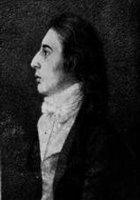Inchcape Rock Poem by Robert Southey
Inchcape Rock
No stir in the air, no stir in the sea,
The Ship was still as she could be;
Her sails from heaven received no motion,
Her keel was steady in the ocean.
Without either sign or sound of their shock,
The waves flow’d over the Inchcape Rock;
So little they rose, so little they fell,
They did not move the Inchcape Bell.
The Abbot of Aberbrothok
Had placed that bell on the Inchcape Rock;
On a buoy in the storm it floated and swung,
And over the waves its warning rung.
When the Rock was hid by the surge’s swell,
The Mariners heard the warning Bell;
And then they knew the perilous Rock,
And blest the Abbot of Aberbrothok
The Sun in the heaven was shining gay,
All things were joyful on that day;
The sea-birds scream’d as they wheel’d round,
And there was joyaunce in their sound.
The buoy of the Inchcpe Bell was seen
A darker speck on the ocean green;
Sir Ralph the Rover walk’d his deck,
And fix’d his eye on the darker speck.
He felt the cheering power of spring,
It made him whistle, it made him sing;
His heart was mirthful to excess,
But the Rover’s mirth was wickedness.
His eye was on the Inchcape Float;
Quoth he, “My men, put out the boat,
And row me to the Inchcape Rock,
And I’ll plague the Abbot of Aberbrothok.”
The boat is lower’d, the boatmen row,
And to the Inchcape Rock they go;
Sir Ralph bent over from the boat,
And he cut the bell from the Inchcape Float.
Down sank the Bell with a gurgling sound,
The bubbles rose and burst around;
Quoth Sir Ralph, “The next who comes to the Rock,
Won’t bless the Abbot of Aberbrothok.”
Sir ralph the Rover sail’d away,
He scour’d the seas for many a day;
And now grown rich with plunder’d store,
He steers his course for Scotland’s shore.
So thick a haze o’erspreads the sky,
They cannot see the sun on high;
The wind hath blown a gale all day,
At evening it hath died away.
On the deck the Rover takes his stand,
So dark it is they see no land.
Quoth Sir Ralph, “It will be lighter soon,
For there is the dawn of the rising Moon.”
“Canst hear,” said one, “the breakers roar?
For methinks we should be near the shore.”
“Now, where we are I cannot tell,
But I wish we could hear the Inchcape Bell.”
They hear no sound, the swell is strong,
Though the wind hath fallen they drift along;
Till the vessel strikes with a shivering shock,
“Oh Christ! It is the Inchcape Rock!”
Sir Ralph the Rover tore his hair,
He curst himself in his despair;
The waves rush in on every side,
The ship is sinking beneath the tide.
But even is his dying fear,
One dreadful sound could the Rover hear;
A sound as if with the Inchcape Bell,
The Devil below was ringing his knell.
Many years ago when just a child, dad and I were looking at the poems in the Knowledge books he had, we came across this poem and read it out loud, it was so stirring that it instantly became our favorite! One Poet I would love to have met, if only I knew Doctor Who and the Tardis :) then go back in time to meet my favorite poet!
Edward David Noel Walker One of the many wonderful poems I learned at Howth Road National school in Dublin, Ireland. When our headmaster ('Jaws' MacIvor)) first read it we were all spellbound. Each of us conjured up our own vision of the Abbot and Ralf the rover. Thanks Robert Southey and Poemhunter.
I had this poem in my school ninth standard. I have read this thousands of times since then... One of the finest poems ever written.
The first line in the third stanza should read ' The good old Abbot of Aberbrothok'
No stir in the air......where was the wind then I love METAPHORS!
Sir Ralph the Rover explain the character, Why the title sir has been used here?
This poem has not been translated into any other language yet.
I would like to translate this poem
He got his just deserts, didn't he? I enjoy tales told in verse- they are apt to keep the reader's interest throughout